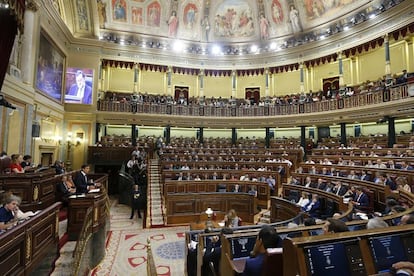US and Latin America baffled by Spain’s political impasse
Leading regional powers wonder why there’s still no government after nine months and two elections

The lack of a government in Spain is puzzling many people in the United States and Latin America, given the ongoing political stalemate, which has lasted nine months already, combined with a steadily improving economy.
Some pundits say that the country that impressed the world with its peaceful transition to democracy in the late 1970s has lost its way. In conversations with EL PAÍS, politicians, writers and intellectuals on the other side of the Atlantic express surprise at the fact that a nation that has enjoyed smooth handovers of government under its two-party system over the last three decades has come to a grinding halt in the new multi-party scenario.
Colombians are offering to give Spaniards a crash course in how to run a country with a broad spectrum of parties
But the political paralysis does not appear to be affecting bilateral relations between governments. Economic relations in particular are strong, say the business communities in Argentina and Brazil, two nations where Spanish companies have a major presence.
In the United States, the situation in Spain is viewed as a domestic issue that does not affect the rest of the world in the way that the economic crisis did.
“Spain is an important ally and NATO friend, and we will continue to work together on our shared priorities,” said US State Department spokesperson Nicole Thomson.

“I don’t think the Spanish system is going to collapse, but it’s not working well,” noted the US historian and expert on Spain Stanley G. Payne.
But Mexican analysts offered a more candid view.
“I am worried and disconcerted by Spain. It’s a pity that with four [political] forces, even if they have less individual clout, they are unable to find a combination that will provide a sufficient majority,” said former Foreign Minister Jorge G. Castañeda.
“Spain represented a model of collective political intelligence, but now that intelligence is marked by fragmentation and infighting. It is up to its politicians to resolve it,” noted Mexican writer Héctor Aguilar Camín. “If the Spanish parliamentary system is no good at building governing majorities, then what is it good for?”
Material for jokes
In Argentina, where Spain is the second-largest source of direct foreign investment, politicians and business leaders often ask Spanish reporters for clues as to what is going on in their country. The stalemate even provides fodder for jokes: asked about controversial issues in Argentinean politics, more than one minister has replied along the lines of: “You form a government first, and then we’ll talk.”
But Agriculture Minister Ricardo Buryaile noted that the lack of government is having an effect on EU-Mercosur negotiations, “because Spain is one of the countries accompanying us to try to push the agreement through. Talks are underway, and it’s going to be hard making decisions while countries such as Spain are in a difficult political situation.”
If Spain is going through a delicate political situation, Brazil is caught up in a full-fledged storm
If Spain is going through a delicate political situation, Brazil is caught up in a full-fledged storm following the impeachment of Dilma Rousseff and swearing-in of Michel Temer as the new president.
“The situation is not ideal,” admitted Spanish Trade Secretary Jaime García-Legaz, who wants to encourage more Brazilian investment in Spain. “Under normal conditions, there would be more visits by the king of Spain and the prime minister, but communications are still within reasonable levels.”
Meanwhile, Colombians are so caught up in the run-up to the October 2 referendum to approve the peace process with the leftist armed FARC guerrilla, that the situation in Spain barely registers at gatherings of politicians and intellectuals. Some say that Spain is clearly unable to come to terms with the end of the two-party system, and are even offering to give Spaniards a crash course in how to run a country with a broad spectrum of political parties.
English version by Susana Urra.
Tu suscripción se está usando en otro dispositivo
¿Quieres añadir otro usuario a tu suscripción?
Si continúas leyendo en este dispositivo, no se podrá leer en el otro.
FlechaTu suscripción se está usando en otro dispositivo y solo puedes acceder a EL PAÍS desde un dispositivo a la vez.
Si quieres compartir tu cuenta, cambia tu suscripción a la modalidad Premium, así podrás añadir otro usuario. Cada uno accederá con su propia cuenta de email, lo que os permitirá personalizar vuestra experiencia en EL PAÍS.
¿Tienes una suscripción de empresa? Accede aquí para contratar más cuentas.
En el caso de no saber quién está usando tu cuenta, te recomendamos cambiar tu contraseña aquí.
Si decides continuar compartiendo tu cuenta, este mensaje se mostrará en tu dispositivo y en el de la otra persona que está usando tu cuenta de forma indefinida, afectando a tu experiencia de lectura. Puedes consultar aquí los términos y condiciones de la suscripción digital.








































